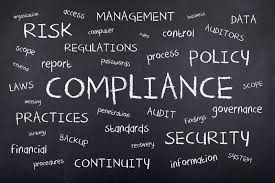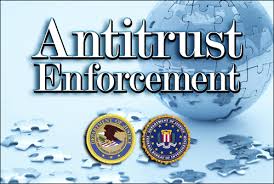The Curious World of the Antitrust Division and Credit for Compliance Programs
 The Antitrust Division is a world unto itself. Ask anyone who works there (including me) or worked there and they will tell you that everyone refers to the Antitrust Division as “The Division,” like it is the only Division in the Department of Justice.
The Antitrust Division is a world unto itself. Ask anyone who works there (including me) or worked there and they will tell you that everyone refers to the Antitrust Division as “The Division,” like it is the only Division in the Department of Justice.
That attitude, however, occasionally carries into substantive areas. The Division is the recognized expert in the Justice Department on antitrust issues – and they will tell you so over and over. Sometimes they get a little carried away and use those arguments to prevent consistency among Justice Department Divisions (e.g. Criminal, Civil, Tax, Environmental) on prosecution policies.
It is important for the Justice Department to design and implement consistent policies and procedures that are applied across the various divisions. (There are certainly reasons for exceptions in some cases but in general it is a good principle to promote).
For some reason, the Antitrust Division has taken a curious and reluctant attitude to credit corporate ethics and compliance programs. Unlike other areas, such as FCPA or AML enforcement, the Antitrust Division is reluctant to reduce corporate fines to recognize a company’s effective corporate compliance program.
For years, the Division argued a tautology – if the compliance program was effective, then the price fixing criminal violation should not have occurred. While facially attractive, the statement does a disservice to situations where some credit may be warranted.
 The Division also argued that since most price-fixing conspiracies were carried out by senior officials, the company should not get the benefit of any credit for a compliance program that senior officers circumvented.
The Division also argued that since most price-fixing conspiracies were carried out by senior officials, the company should not get the benefit of any credit for a compliance program that senior officers circumvented.
Perhaps the Division’s strongest argument through the years has been that companies already received significant benefit under its leniency program. Again, that may be true for the first member of a cartel who cooperates and rats out the other members of the cartel. Subsequent cooperators, however, still may have to be substantial fines and should be given some consideration for their ethics and compliance program.
In recent public speeches (here and here), Antitrust Division officials reiterated their view while trying to encourage companies to increase compliance efforts. In essence, the officials told companies to increase compliance programs because it was in their interest to detect and prevent antitrust violations. Well, talk about a profound grasp of the obvious.
The issue, which the “Division” officials ignored (or rejected) was giving companies additional credit for an “effective” ethics and compliance program beyond that earned from a corporate leniency program. Division officials are well aware that companies are improving corporate ethics and compliance programs. The Division has to recognize this phenomenon and offer some type of credit to companies for implanting effective ethics and compliance programs (beyond the potential 3-point reduction under the Sentencing Guidelines that has only been awarded to a handful of companies).
Frankly, the Division’s attitude towards corporate compliance programs is inexplicable. A company that engages in AML violations can earn credit for an effective AML compliance program, while a company that engages in price-fixing and receives similar punishment is denied possible credit for its ethics and compliance program?
 The Division’s view is contrary to an explicit statement by the Criminal Division in its FCPA Guidance that companies can still receive credit (and even a declination) if they maintain an effective ethics and compliance and violate the FCPA.
The Division’s view is contrary to an explicit statement by the Criminal Division in its FCPA Guidance that companies can still receive credit (and even a declination) if they maintain an effective ethics and compliance and violate the FCPA.
That result does not make sense – there is no rationale for distinguishing to the detriment of the antitrust violator. The Division recognized that it could not maintain its position – they saw the handwriting on the wall and they tried to get out in front of the issue by relaxing their usual statements about corporate compliance programs but their speeches were in reality a glossed over re-statement of prior policies.
In the end, the Division can easily play a shell game. Division officials can take a company’s ethics and compliance program into account when negotiating a resolution of a criminal case and claim that they gave it some weight in the final calculation. There are very few, if any, circumstances in which a company could conceivably earn a declination for price-fixing charges even with an effective ethics and compliance program.
I hope that the Division takes a more pragmatic approach to the ethics and compliance issue, and embraces meaningful credit for companies as a way to encourage companies to implement effective compliance programs.
















As someone who has been an inhouse counsel doing antitrust and other corporate compliance programs and am currently back in federal service in one of the civil antitrust enforcement agencies–the FTC, I think that I bring a unique perspective to this debate. The required disclaimer first: These are my personal views and do not represent the views of the FTC or any of its Commissioners, nor of the General Counsel or the Office of the General Counsel where I work. When I started practicing antitrust law, both law enforcement agencies looked to the organized bar, especially the Antitrust Section of the ABA, to be the frontline enforcers of the antitrust laws by encouraging antitrust compliance programs. In my opinion, it is incorrect to say that an antitrust violation means that an antitrust compliance program does not work and is, therefore, not “effective.” The U.S. Sentencing Guidelines don’t say that. Unfortunately, there are many reasons why employees may still engage in cartel activities in spite of the warnings from their internal lawyers through the antitrust compliance programs. The only difference is that those employees engage in the conduct in spite of company policy and knowing full well the risks to them personally and to the company. As I used to say at the end of my compliance lectures, if you choose to violate the antitrust laws inspite of knowing the risks, the Law Department and the company will not protect you. I understand the Department of Justice’s position that their Leniency Program provides a greater benefit to the first company in the door for companies to undertake an antitrust compliance program than any credit under the Sentencing Guidelines. However, if the Criminal Division, the Environmental Protection Agency, and the Securities and Exchange Commission give credit for compliance programs for criminal violations of their laws, no reason why the Antitrust Division couldn’t do the same. First, the Division wants to encourage corporate antitrust compliance programs for companies to discover antitrust violations and report them to the Division before the Division discovers them. While the company that wins the race to the Division gets leniency, no reason why cooperating companies that come in later can’t have their antitrust compliance efforts recognized through credit under the Sentencing Guidelines and other incentives. It doesn’t have to be an “either or” proposition. Antitrust practitioners and the Antitrust Section should continue to press for engagement with the Antitrust Division to find some means of crediting those with compliance programs who, for whatever reason, don’t win the race to the Division for Leniency. At least, that’s the way I see it.